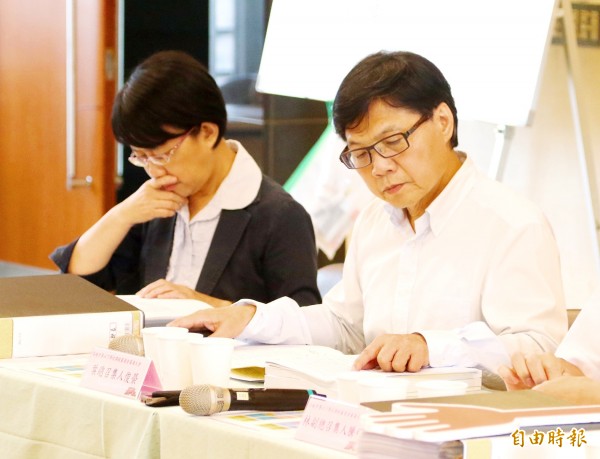《TAIPEI TIMES》 History curriculum review starts today

Minister of Education Yeh Jiunn-rong, right, on Saturday last week inspects documents during a review of curriculum guidelines for natural sciences in the 12-year national education program. Photo courtesy of the Ministry of Education
HIGH PRESSURE: With three weeks to go until a deadline, a KMT representative asked if the responsible institute’s president and vice president might have been made to resign
By Rachel Lin, Shih Hsiao-kuan and Jake Chung / Staff reporters, with staff writer
The Ministry of Education’s meeting on the 12-year national education curriculum is to convene at the National Academy for Educational Research (NAER) today to review the draft guidelines for social science subjects, with Minister Yeh Jiunn-rong (葉俊榮) chairing the panel.
The ministry has been rushing to finish its review of the guidelines by the end of the month, which is necessary for the guidelines to take effect at the start of the schoolyear next year. Over the summer, it has increased the frequency of review sessions, which were previously held on Sundays.
Draft guidelines for social science subjects propose to reduce the amount of rote memorization at high schools and shift the focus of history textbooks from a Han ethnicity-centered history to the history of Taiwan over the past 500 years.
The draft curriculum proposes to turn the three subdivisions in history textbooks — History of Taiwan, History of China and World History — into three separate courses worth two credits each, named “Taiwan and related history,” “China and East Asia” and “Taiwan and the World.”
According to social science subjects panel convener Chang Mau-kuei (張茂桂), history is about the cause and effect of events and students should learn to view history from a broader regional perspective instead of the angle of one nation and one people.
The new curriculum is not seeking to place Chinese history in the category of East Asian history, nor is its purpose to supplant Chinese history with East Asian history, Chang said.
The draft proposes instead to understand Chinese history on a regional scale instead of by the dynastic history of China, he said.
The new curriculum seeks to emphasize the link between Taiwan, China, Eurasia and world history, and show the necessity of globalization in the modern era, deputy convener Chin Shih-chi (金仕起) said.
National Dong Hwa University student Hsiao Chu-chun (蕭竹均), the student representative on the review committee, said that he would demand that more Taiwanese history be included, with the ultimate goal of having no less than half of all class hours spent on Taiwanese history.
Hsiao was among a group of students protesting curriculum changes in 2015 and calling for greater transparency in how guidelines are changed, the retraction of the changes and a more culturally diverse curriculum.
Hsiao said that historic justice and transitional justice should be taught in History and Civil Ethics class.
The panel should consider teaching the history of Aborigines, exploring the slander and discrimination they have faced, Hsiao said.
Advocating localization and embracing internationalization do not necessarily clash, National Sun Yat-sen University professor Yen Ching-hsiang (顏慶祥) said.
The more a nation seeks to embody and to be represented by the cultural history of their nation, the more the international community will consider its culture “unique,” Yen said, adding that Taiwanese students should develop more confidence about their feelings for their country.
Acting Chinese Nationalist Party (KMT) Culture and Communications Committee Director-General Tang Te-ming (唐德明) yesterday said that it was unusual that NAER president Sheu Tian-ming (許添明) on Wednesday last week resigned from his function and the review committee if the review is urgent.
Vice Premier Shih Jun-ji (施俊吉) is left to head the academy now that its vice president has also resigned, which raises the question of political intervention, Tang added.
Placing China’s history in the greater context of East Asia means forgetting one’s roots, Tang said, adding: “How would the Xinhai Revolution [which ended imperial rule in China and led to the establishment of the Republic of China by Sun Yat-sen (孫逸仙)] be explained from the context of East Asian history?”
If young people do not understand the greatness of their nation and the difficulty of its founding, it would be difficult for them to identify with the country and its history, Tang said.
If that were to happen, the Democratic Progressive Party would accomplish its political goal of desinicizing Taiwan entirely, he added.
新聞來源:TAIPEI TIMES
















